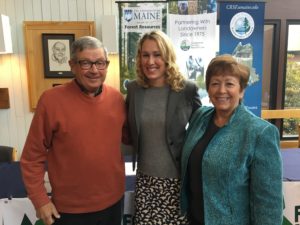A Second Golden Age for Maine’s Forests

Jim Robbins, former president and fourth generation owner of Robbins Lumber, Charlotte Mace, executive director of Biobased Maine, and Patty Daigle, selectman in East Millinocket and retired town and city manager for four different paper mill communities, including Millinocket, Old Town, East Millinocket, and Lincoln.
Biobased Maine joined industry leaders, experts, community members, and other major stakeholders at the University of Maine in Orono on Tuesday to announce a new vision to grow Maine’s forest industry 40 percent, from $8.5 billion to $12 billion annually by 2025—by diversifying its wood products, attracting new investment, and developing economic prosperity for communities impacted by paper mill closures. (Read the full document here.)
As a member of the executive steering committee of Forest Opportunity Roadmap/Maine (FOR/Maine), the collaboration between industry, communities, government, education and non-profits behind the new vision, Biobased Maine played a key leadership role in developing FOR/Maine’s vision for future, diversified products that could be made from Maine wood.
“Maine was built in large part on the first golden age of Maine’s forest industry. Now we have the opportunity to rise again on the second golden age of Maine forestry.”
“We see the opportunity to create whole new value streams by achieving commercial scale technologies that convert second-generation forest residuals into biobased chemicals, bioplastics, advanced biofuels, nanocellulose, and other high-value materials,” said Charlotte Mace, executive director of Biobased Maine, speaking on the panel at Tuesday’s event.
Indeed, some examples of high-value biobased products that could be manufactured from sustainably harvested wood here in Maine include cellulose nanofibrils, incredibly light and strong fibers that can be used in a wide variety of commercial applications, and cellulosic sugars, a platform chemical for biodegradable bioplastics such as polylactic acid (PLA), lactic acids, and succinic acid.
“Maine was built in large part on the first golden age of Maine’s forest industry. Now we have the opportunity to rise again on the second golden age of Maine forestry,” Mace said.
Maine media reported widely on the new vision for Maine’s forest industry, including in-depth reporting from Bangor’s Channel 7 on the biobased products that could be made from sustainably sourced Maine wood. Watch the segment here.
